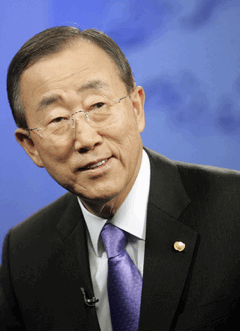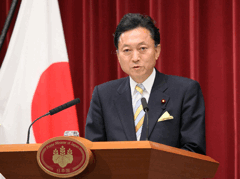Treaty Challenges
Air Date: Week of September 18, 2009

United Nations Secretary General Ban Ki Moon is convening a climate change summit, and has called climate change “the greatest collective challenge we face as a human family.” (Photo: UN Photo/Devra Berkowitz)
With fewer than three months before the UN climate change conference at Copenhagen, world leaders meet to try to break through remaining obstacles to a new treaty. Host Steve Curwood speaks with Jennifer Morgan, who directs the Climate and Energy Program at Washington’s World Resources Institute. They discuss a possible U.S.-China partnership on climate change, Japan's new emissions cutting goals, and how industrialized countries need to help the developing world prepare for and slow climate change.
Transcript
[THEME]
YOUNG: From the Jennifer and Ted Stanley studios in Somerville, Massachusetts, this is Living On Earth. I’m Jeff Young.
CURWOOD: And I’m Steve Curwood. With less than three months to iron out a new treaty to replace the Kyoto protocol, there’s a blizzard of climate change summits acomin’: New York, Pittsburg, Bangkok, Barcelona. All opportunities to reach agreement, but the climate remains uncertain for a deal. The United States has yet to match the emissions cuts promised by the Europeans and the Japanese.
And developing countries are still waiting for help from the richest nations to cut emissions and adapt to climate disruption. The U.S. and China together account for more than 40 percent of global warming gases, and the two have been negotiating extensively about how they might partner to move forward. Jennifer Morgan is director of the Climate and Energy Program for the World Resources Institute in Washington D.C.
MORGAN: The thing to note is that the U.S. and this new administration is actually pursuing climate change on a number of different fronts. They’re engaged in the UN negotiations, they’ve started this major economies forum where they’re bringing the major economies together, and they’re pursuing their bilateral relationships – a very important one – which is with China.

Jennifer Morgan
CURWOOD: What might be the first step that would show that there’s substance to this notion that the U.S. and China will work something out bilaterally in the context of the UN negotiations?
MORGAN: I think a good step would be actually some very specific and concrete, hopefully transformational partnerships on buildings – energy efficiency buildings – on carbon capture and storage. Both countries have a large coal base and they both need to figure out how to produce zero-emissions coal.
So, if there was a partnership where they both said we’re going to do a set of demonstration plants, together, to figure how we’re going to work this technology. If they were to do that on some solar technology, so some very specific, big technology projects.
That would be one thing. I think the other thing that would be very helpful is if both countries worked on how they’re gonna measure, report, and verify their emissions. What systems of transparency are they going to set up, and to really start building the capacity in China to do that kind of measuring, reporting, and verification, and the U.S. has obvious experience in this. So, those two areas, I think, are kind of the foundation, but also really looking transformationally how we’re going to decarbonize these two economies, which, you know, starts in Copenhagen, but is a way, much longer process to get there.
CURWOOD: In the context of these negotiations with China, a row has erupted over tariffs the U.S. is going to impose -- a tire tariff. This comes just at the moment the U.S. is trying to come together with China on a bilateral agreement around climate. Some might say that there might be domestic factors in both countries that might see it in their interest to have talks fall apart on the issue of trade.
MORGAN: I think that the trade agenda obviously is an incredibly hot, difficult, and challenging issue and it is also in the thick of the climate issue. There are proposals on Capitol Hill in legislation that China would certainly find completely unacceptable, and there are concerns, obviously, in the United States that feel that those types of measures are needed.
My hope is that we can find a solution where through a global agreement we see that actually these competitiveness concerns, we don’t need these additional trade measures in order to get a deal. I think that this is something that could really blow up in our faces if we’re not careful, and goes way beyond the climate agenda, and hasn’t yet really gotten the adequate attention that it needs.
CURWOOD: And then, of course, there’s Japan: the world’s second-largest economy. Its incoming prime minister says that he now wants to cut emissions by 25 percent over 1990 levels over the next ten years. Of course the condition is if only other developed countries set similar ambitious goals. So, how does Japan come out now in terms of leadership for action on climate change?

Japan’s new prime minister, Yukio Hatoyama, has pledged to cut Japan’s greenhouse gas emissions by 25 percent. (Courtesy of the Prime Minister of Japan and His Cabinet)
That’s the kind of dynamic that we need. That shared endeavor to save the planet and shift to a low-carbon economy. And I think the shift of Japan is very significant because they, in the past, have been quite negative on this. And this new government sees this, I think, as an opportunity.
Japan is highly efficient, the export potentials could be large for such a nation, and, you know, they’ve got the systems in place. And China, of course, is a key one for them, as well. They’ve got lots of bilateral relationships going there. So, I hope that Japan can provide some inspiration.
CURWOOD: Now, what about the African block? Last month there were a group of African countries that says that it needs, what? 60, 70 billion dollars a year to help deal with the effects of climate change. And now the prime minister of Ethiopia says, um, Africa’s not going to go along with the treaty unless the developed world responds.
MORGAN: Africa has, perhaps, the most at stake in this agreement along with the small island nations. If there is not an agreement in Copenhagen, and we don’t move towards this low-carbon economy, the impacts hitting Africa are really in the life and death category.
And therefore I think it’s completely understandable for Ethiopia and others to be raising the red flag, and saying this – this is about our, not just our economic wellbeing, it’s about our health, it’s about, you know, these people are so poor and the additional impacts of climate change, further droughts, food security issues are so dire that they, I hope, will be a formidable block moving forward.

United Nations Secretary General Ban Ki Moon is convening a climate change summit, and has called climate change “the greatest collective challenge we face as a human family.” (Photo: UN Photo/Devra Berkowitz)
CURWOOD: Jennifer Morgan is the director of the Climate and Energy Program for the World Resources Institute. Thank you so much, Jennifer.
MORGAN: Thank you.
[MUSIC: DJ Cam “Ghetto Love” from ‘Loa Project Vol.2’ (Laurant Daumail Productions - 2000)]
Links
Living on Earth wants to hear from you!
Living on Earth
62 Calef Highway, Suite 212
Lee, NH 03861
Telephone: 617-287-4121
E-mail: comments@loe.org
Newsletter [Click here]
Donate to Living on Earth!
Living on Earth is an independent media program and relies entirely on contributions from listeners and institutions supporting public service. Please donate now to preserve an independent environmental voice.
NewsletterLiving on Earth offers a weekly delivery of the show's rundown to your mailbox. Sign up for our newsletter today!
 Sailors For The Sea: Be the change you want to sea.
Sailors For The Sea: Be the change you want to sea.
 The Grantham Foundation for the Protection of the Environment: Committed to protecting and improving the health of the global environment.
The Grantham Foundation for the Protection of the Environment: Committed to protecting and improving the health of the global environment.
 Contribute to Living on Earth and receive, as our gift to you, an archival print of one of Mark Seth Lender's extraordinary wildlife photographs. Follow the link to see Mark's current collection of photographs.
Contribute to Living on Earth and receive, as our gift to you, an archival print of one of Mark Seth Lender's extraordinary wildlife photographs. Follow the link to see Mark's current collection of photographs.
 Buy a signed copy of Mark Seth Lender's book Smeagull the Seagull & support Living on Earth
Buy a signed copy of Mark Seth Lender's book Smeagull the Seagull & support Living on Earth

